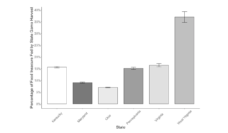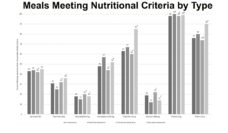PHP: How did the idea for About Fresh come about?
Josh Trautwein: I was working as a community health worker on a nutritional education program when the only grocery store in the neighborhood closed down. I had no answer for how to change the fact that there was no food close by to where my patients lived. That is what brought on our mission to get healthy food to everybody.
Can you touch on the three different areas of food insecurity that About Fresh aims to address: retail access, purchasing power, and the culture and built environment?
Through our Fresh Truck mobile market model, we worked on bringing food into communities that lack access to affordable healthy food options. That’s a really important factor behind the development of our programs. Culture influences how we make our food shopping decisions. We try to uplift the full diversity of food cultures that are represented in the city and, particularly, a health-centered culture of food. Lastly, the greatest opportunity that we see to affect how people access healthy food is purchasing power and affordability. You can do all the work that you want to provide nutrition education and bring food closer to communities, but if you don’t change how much money people have to go shopping for healthy food, you’re not going to get very far.
Fresh Connect is a really interesting program that About Fresh offers. Can you explain how the program works and who can participate?
When social service agencies, healthcare providers, social workers, or teachers recognize that a household or an individual is struggling with food insecurity, they can administer Fresh Connect. We have a web-based enrollment platform that allows the provider to create a profile for the person. Then that patient is mailed a Fresh Connect card that enables them to shop for fresh fruits and vegetables across our network of retailers. The Fresh Connect card recognizes approved healthy foods at the point of sale and automatically draws down the cost of those healthy foods without any manual sorting on the part of our shopper or the in-store retail associate. We also analyze the data over time to see whether or not there are positive trends with health related to shopping and Fresh Connect program engagement.
How has Covid-19 impacted your services and, also, the availability of food insecurity interventions in general?
Covid disrupted the operational format of so many programs, including ours. We brought our Fresh Truck mobile market models completely outdoors and kept everyone physically distant. There were fewer hunger relief programs overall and many people were cut off from access. That brought on brand new programs from the ground up including our Fresh Box program, a direct-to-doorstep grocery delivery program. Additionally, financial instability and health concerns drastically increased the severity of food insecurity.
What is a continuing challenge of your work?
We are addressing symptoms of deeper underlying drivers of why people are food insecure in the first place including income inequality, housing instability, and minimum wage. We’re really trying to imagine how we find a balance of meeting the right-now needs of people while addressing those deeper underlying causes of why people are food insecure.
Where do you see the future of solving food insecurity?
The big future bet that we’re making is that healthcare is going to be a powerful investor in the food system. Food is responsible for a trillion dollars of direct and indirect healthcare costs. It is a great opportunity to recruit healthcare as an investor in a future food system that is climate-resilient, economically just, and promotes health.
Learn more about About Fresh here.














